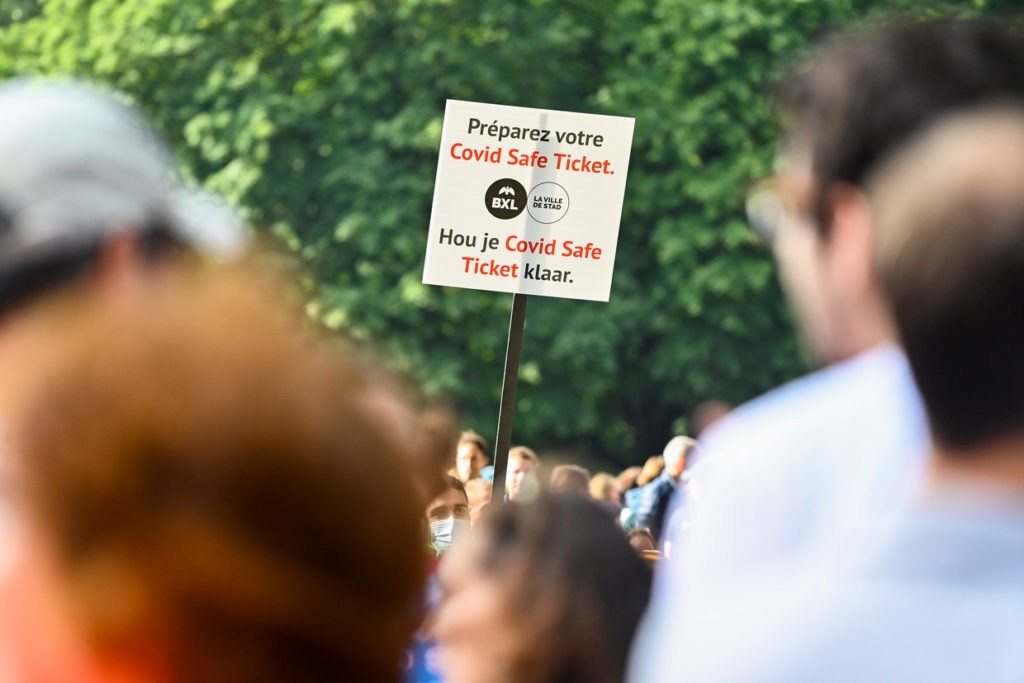The handful of measures (re-)introduced by Belgium's Consultative Committee on Tuesday in response to the worsening coronavirus situation have had a mixed reception from virologists, politicians and federations.
While the return of face masks in all indoor spaces was welcomed by experts, the expansion of the Covid Safe Ticket (CST) in Flanders received criticism from politicians and, in part, federations representing hospitality businesses.
Face masks indoors
The Government announced that wearing face masks would once again be compulsory in shops and other indoor spaces in Flanders (this rule never relaxed in Brussels and Wallonia) from Friday 29 October.
This decision was particularly welcomed by virologist Steven Van Gucht, who had previously criticised the Government's decision to relax this measure, saying it was "written off too early."
"The fact that we are wearing masks again in some places might make people more careful in other places. That combination will make a difference," Van Gucht told Belga News Agency.
"If we each think about what we can do to reduce our close contacts, wearing the face mask more where it may not be obligatory but is useful, we will see the difference," he added.
Expanding the CST in Flanders
From 1 November, “the CST must be shown throughout the country when visiting the catering industry and fitness centres,” De Croo said on Tuesday. After having shown the pass, the mask requirement is dropped. However, those working in the establishments must wear masks.
Politicians, such as Bart De Wever, as well as virologists, expressed their concern about the use of the CST, warning that it can give a false sense of security.
"You have to be honest: a Covid Safe Ticket is not 100% safe but it does reduce the chances of getting infected. People with a Covid Safe Ticket can still carry the virus and turn out to be infectious, but they are usually less infectious and for a shorter period of time," GEMS advisory board member Marc Van Ranst told De Morgen.
He stressed that "doing nothing was not an option now," adding that introducing this pass for customers in the hospitality industry is an incentive for unvaccinated people to get vaccinated, which he said is an "indirect benefit."
Related News
- Offers for fake Covid Safe Tickets circulating on social media
- Vaccination uptake surges in Wallonia following CST announcement
Meanwhile, Horeca Vlaanderen is disappointed that face masks will be compulsory for hotel and catering staff even if the CST is being used, and pleaded for freedom of choice.
"We don't see why a staff member must wear a face mask while someone who comes in for a coffee with CST can enter without a mouth mask," said Matthias De Caluwé, CEO of Horeca Vlaanderen.
The CST will also be mandatory in gyms, but not in dance schools, swimming clubs and boxing clubs, a decision lamented by Belgian Fitness Federation Fitness.be.
"I don't understand why the introduction of the Covid Safe Ticket is only happening in our sector. It is discriminatory and stigmatising that only the private sector is targeted," said Fitness.be's Erik Vandenabeele.
For public events, the CST will be compulsory when 200 or more people are inside and 400 or more are outside. But anyone organising an event can choose to use the CST, even if the capacity is below the compulsory threshold. Van Ranst welcomed this announcement.
"This places the responsibility on the organisers. Many people also expect this, that they can decide for themselves about the risks they take."
Flemish minister-president Jan Jambon said he was pleased the Government did not go ahead with the proposal supported by Health Minister Frank Vandenbroucke for it to be used at events with 50 people indoors and 100 outdoors.
Teleworking
Lastly, the Government announced that working from home is again strongly recommended, although not compulsory.
Trade federation Comeos regretted that compulsory vaccination in the workplace was not proposed, arguing that the "Government is not taking its responsibility in this matter."
"We have been talking for months about compulsory vaccination for health care workers and even this is not yet a reality. France introduced this measure this summer and we have to wait much longer here," the organisation said.
Overall, experts and politicians have stressed that the closure of certain sectors or another lockdown should be avoided at all costs and is not currently on the table.
"We want to avoid that and I don't think it will happen," said Van Ranst.

